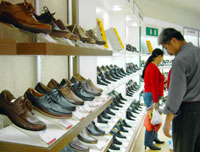|
China hopes for solution to EU shoes spat
(Reuters/Bloomberg)
Updated: 2006-02-21 18:58 China's foreign ministry struck a conciliatory
tone on Tuesday in the latest trade row with the European Union, expressing hope
that talks will stave off anti-dumping duties on Chinese shoe exports to the
bloc.

A customer makes a
selection of China-made shoes at a market in Yichang, central China's
Hubei Province in this August 22, 2005 photo. EU will impose import duties
as high as 20 percent on some leather shoes from China and Vietnam
starting in April. [newsphoto] | The European
Commission confirmed on Monday it had evidence of dumping by Chinese and
Vietnamese exporters of leather shoes after finding manufacturers benefited from
state intervention.
The commission, in charge of trade policy in the 25-member EU, declined to
comment on measures it could take.
But a source familiar with the investigation said the Brussels-based
executive would recommend duties of less than 20 percent, to be phased in from
April 7.
Chinese Foreign Ministry spokesman Liu Jianchao said frictions were bound to
arise as Sino-EU trade grew.
"We hope the two sides resolve any problems on the basis of mutual benefit
and mutual respect," he told a regular news conference.
Liu noted that Beijing and Brussels settled a number of trade disputes last
year through negotiations. Chief among these was sparked by a surge in Chinese
exports of textiles following the abolition of global quotas.
The shoes case is one of a proliferation of anti-dumping actions involving
China, whose exporting prowess is raising political hackles in Europe and the
United States.
Brussels is also probing whether China exports plastic bags more cheaply than
it can produce them, and just last week the EU settled a similar row over iron
castings.
Chen Zemei, a director of Zhejiang Saina Group, said it was absurd for the EU
to rule that Chinese shoe makers were dumping goods in Europe. Anti-dumping
inspectors from Brussels combed his company for five days last November.
"Most of us are private enterprises and our biggest priority is to make
money, so it is impossible for us to sell our products at a price lower than
costs," said Chen.
|